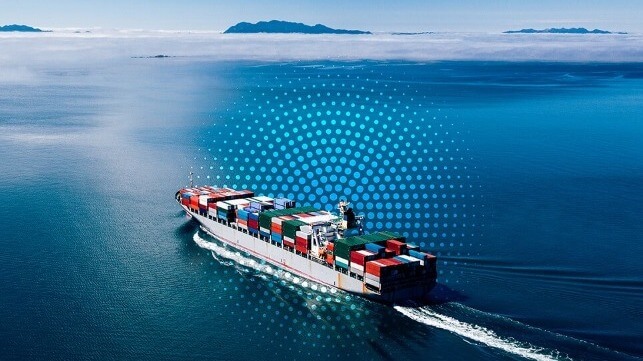Accelerating Digitization and Optimizing Operations in Maritime

With more than 90% of traded goods transported via merchant vessels, the merchant maritime industry is an integral part of the increasingly interconnected global economy. According to Harbor Research, as seaborne trade grows to meet the expected increased demands of e-commerce, commercial cargo ports will represent nearly 91% of the broader $45.5 billion maritime industry by 2026.
These indicators, together with booming orders for new container ships and the recovery of the supply chain in the wake of the pandemic, suggest prosperous times are ahead for owners and operators of merchant maritime businesses. But as demand for commerce grows seemingly unabated, the industry faces multiple challenges.
First, growing global fleets needed to accommodate demand will require greater numbers of ship workers at a time when labor shortages are rampant. Estimates suggest there could be a shortfall of as many as 90,000 seafarers by the end of the decade.
Second, port congestion continues to pose disruptions to operations. The industry’s biggest pain point currently is accessing ports and then efficiently offloading cargo. Consumer shifts to purchasing online during the pandemic have persisted, forcing traditional brick-and-mortar retailers to become e-commerce operations that ship directly to homes, overcrowding ports with more erratic shipping schedules. Vessels are spending more time waiting for port entry. Once docked, they are often subject to delays or held captive by slow loading and unloading operations, all leading to days of decreased productivity, wasted fuel, and lost revenue.
Finally, expanding merchant fleets and adding more frequent shipping voyages only add to emission releases during a time when the pressures to meet sustainability and carbon neutrality requirements continue to grow. It is estimated that 17% of all human-caused carbon emissions will come from the merchant shipping industry by 2050.
Merchant vessel owners seeking to capitalize on growth opportunities can address many of these challenges by deploying a high throughput satellite solution to digitize operations, capture and action data, enhance welfare for crews at sea, and help meet the more stringent demands for sustainability. With merchant vessels now operating at over-capacity, operators can leverage satellite communications to improve cost control, automation, and optimization.
Optimizing Operations
With an industry-wide focus on maximizing vessel efficiency, satellite networks can greatly help merchant owners as they adopt and deploy new systems to increase visibility and provide remote access to key vessel metrics. Applications for predictive maintenance designed to maximize vessel uptime have significant connectivity needs. By purchasing more bandwidth or becoming more efficient in allocating their bandwidth usage, merchant fleet operators can better maximize the productivity of their assets.
Elevating Crewmember Welfare
Merchant voyages can last for weeks or even months. During these often-grueling journeys, crews want to be able to reach friends and family, watch the latest movies and shows, or simply access the internet. Vessel owners know that remaining competitive for sea laborers is, in large part, dependent on providing a premium at-sea connectivity experience. As bandwidth demands for operational requirements continue to rise, a robust, high-throughput satellite solution can deliver reliable connectivity to meet crew expectations.
Meeting Increasing Sustainability Standards
Vessel owners have worked to reduce emissions by updating older fleets, utilizing larger ships to require fewer loads, and traveling at reduced speeds to conserve fuel. But the pressure to accelerate sustainable operations is only escalating. Compliance can be more easily achieved by leveraging connected, real-time applications that can help merchant ships optimize routes, reduce time at sea, and lower fuel consumption. These applications need access to robust, uninterrupted connectivity. Satellite networks can help vessel owners operate fleets more environmentally consciously, avoiding fines and staying in the good graces of regulators as new standards continuously emerge.
A Satellite Powered Solution for the Merchant Maritime Industry
Intelsat FlexMaritime is an award-winning, high-performance service that provides consistent, "always on" connectivity anywhere in the world with unrivaled network uptime, meaning users won't have to worry about a lack of service availability or quality. As a global, fully managed connectivity solution, FlexMaritime removes the complexity of dealing with bandwidth availability, configuration, and network infrastructure management, giving vessel owners, operators, and captains peace of mind at sea.
With the merchant segment indicating continued strong growth, keeping up with demand and maximizing profitability requires the adoption of a modern and flexible communications network. Satellite communications networks, like Intelsat FlexMaritime, can play a critical role in accelerating digitization, enabling access to critical applications, and enabling merchant vessel owners to confront industry-wide challenges and extract maximum value from their fleets.
Intelsat FlexMaritime is designed specifically to meet the evolving business requirements and increasing connectivity demands of maritime shipping companies. Visit the Intelsat website to learn more.
The opinions expressed herein are the author's and not necessarily those of The Maritime Executive.

